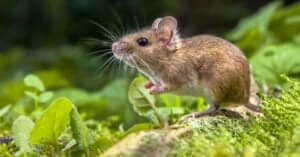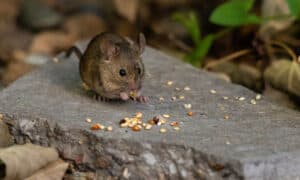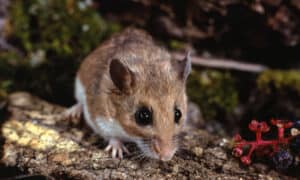Many people have heard the nursery rhyme about blind mice, and that has led to some misconceptions about how mice perceive the world around them. Mice are not inherently blind, but they don’t have very large or complex eyes, either. The questions about these rodents’ vision continue to spawn questions like, can mice see in the dark?
Today, we’re going to explore the answers to that question and discover if mice see in the dark as well as the role that their other senses play in helping them perceive the world around them.
How Well Do Mice See?
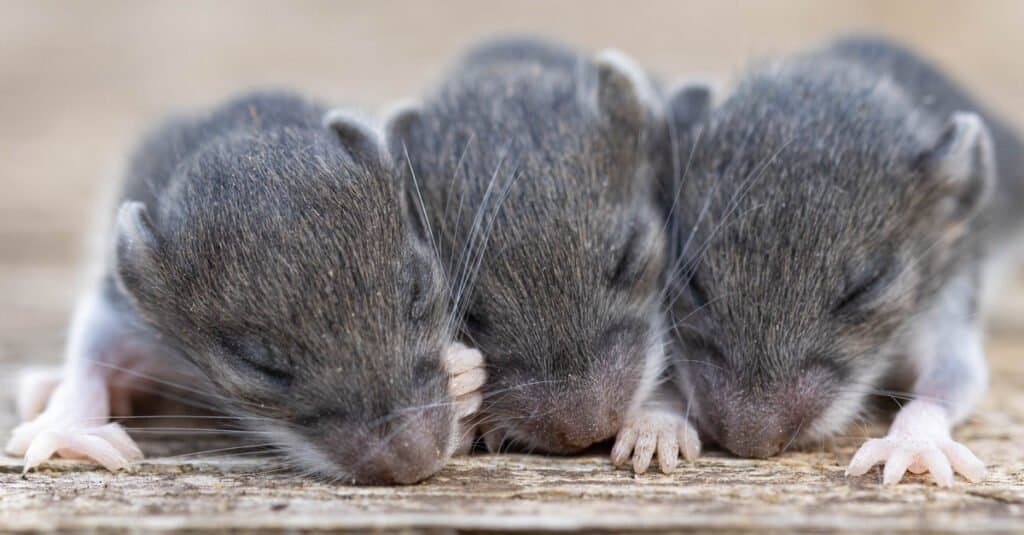
Mice cannot see well, especially when they’re newborns.
©Jennifer Thornhill/Shutterstock.com
Contrary to some beliefs, the vast majority of species of mice do have the ability to see. However, mice do not see very well compared to primates and other animals with highly developed eyes. Instead, scientists believe that mice can see the shape and orientation of objects but cannot make out the fine details.
In many cases, they do not need to know the details of an item as they scurry about. Instead, they need to focus on whether the object is something that they can traverse or a creature that can cause them harm.
Moreover, mice cannot see over very long distances. It’s believed that mice can only focus on objects that are a few feet away from them. They can see farther than a few feet, but they cannot see the fine details of such objects.
All in all, mice do not have a very good sense of sight, but that doesn’t mean they are blind. Yet, does that inhibit their ability to see in the dark?
Can Mice See in the Dark?
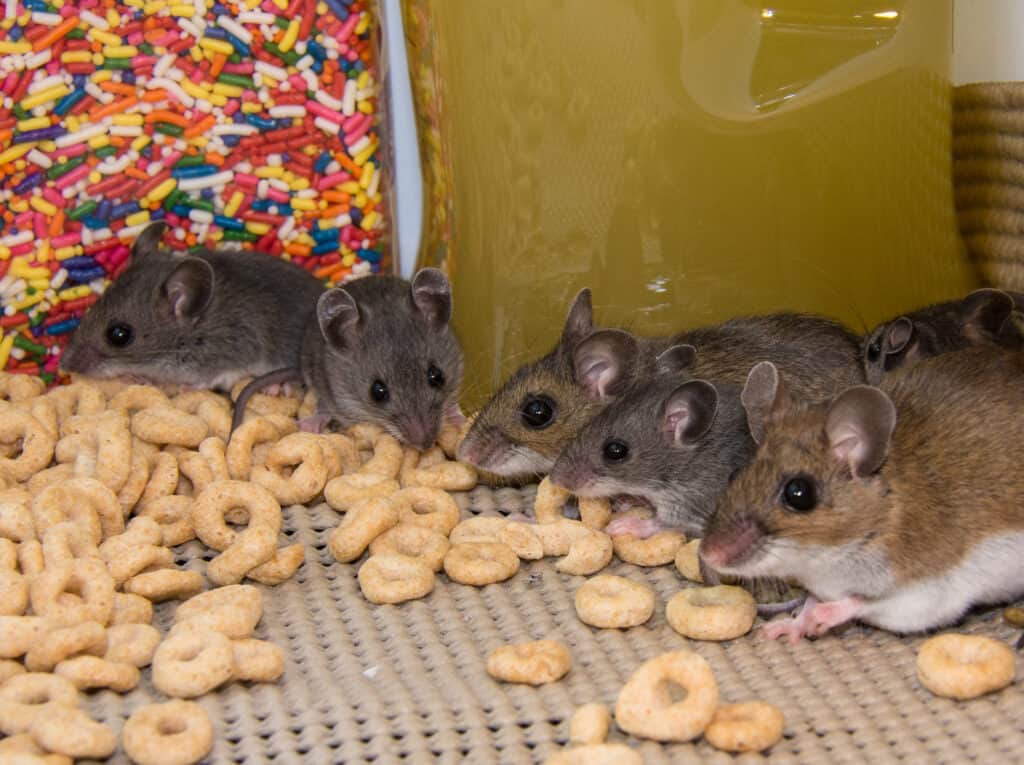
Mice can’t see well in the dark, but they have other senses.
©Landshark1/Shutterstock.com
Mice can see in the dark, but their vision is poor no matter what lighting is available to them. In fact, their vision in the dark is so poor that they might not respond much to objects in low-light scenarios. Instead, they will just react to the presence of motion or sudden changes in the amount of light their eyes are processing.
That could explain why mice scatter when a human enters a dark kitchen and turns on a light. They notice the movement in the dark as well as the sudden influx of light and know it’s time to leave the area.
So, if mice have such bad vision in the dark, how is it that they’re primarily nocturnal creatures? They have to have some method of finding food and shelter in the absence of light. Let’s take a closer look and see how these animals are actually well-adapted to the darkness around them.
How Do Mice Find Their Way in the Dark?
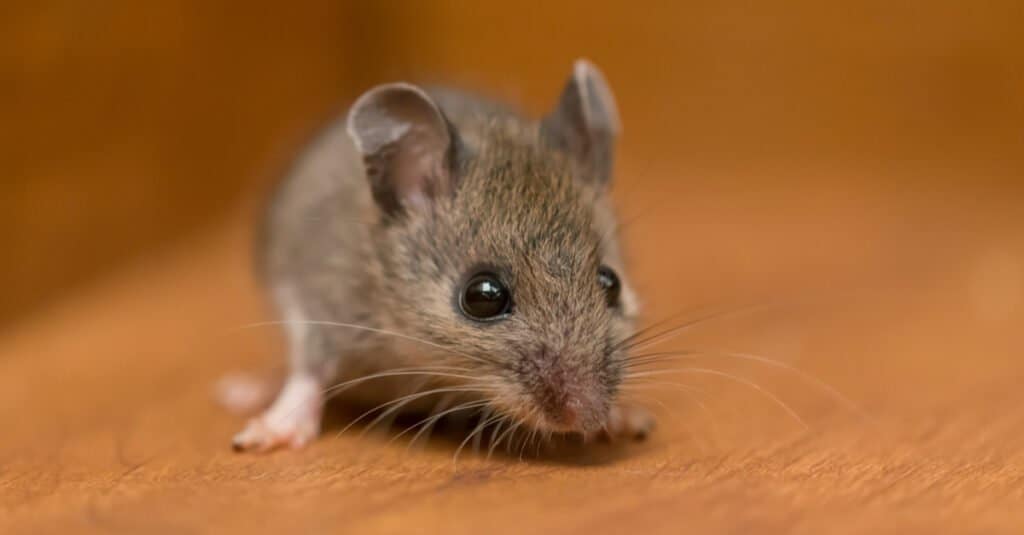
Mice use their senses of smell, touch, and hearing to avoid predators and obstacles in the dark.
©MainelyPhotos/Shutterstock.com
If mice can barely see in the dark, how is it that they’re so elusive to humans and other animals? Rather than rely on their sense of sight to guide them in the darkness, mice use their other senses. The three senses that they make the most use of include touch, smell, and hearing. All of these senses are far stronger than their vision.
The disparity between their sight and these other senses helps explain how they’re able to operate in the dark so well. We’re going to examine each of these three senses and show you how much use each of them to find food and stay safe.
Touch
A mouse’s sense of touch is quite powerful. Instead of using their feet to find their way around, mice make use of their whiskers. According to a study by UC Berkley, mice move their whiskers around and similarly feel their environment to humans using their fingers to feel.
As a result, the mice develop a spatial map that they can use to navigate an environment. Mice have about two dozen whiskers, and they can feel the world around them as they’re running through it. As a result, mice can make very quick decisions about whether they’re going in the right direction or not.
Smell
Their sense of smell is another powerful sense that mice use to interact with the world around them. Specifically, they use their powerful sense of smell as a means to find food and avoid danger. Mice are drawn to foods with a powerful smell, like cheese. They will have no problem running stopping in their tracks to follow a smell that can lead them to food.
Of course, their sense of smell is also helpful in allowing them to avoid harm. Their keen sense allows them to sniff out predators and avoid them. For example, they can smell your cat’s litterbox from far away, and they know to avoid that area of the home or else they can find themselves in serious trouble.
That means you can use their sense of smell against them when you’re trying to get into your home. You can utilize peppermint oil and other smells that mice hate to keep them from trying to get into your home. They have sensitive noses, and they would rather find a new way to get into your home than go through areas rife with cayenne pepper or other uncomfortable smells.
Hearing
Lastly, mice use their sense of hearing to stay safe. Although they can’t hear lower frequencies as well as humans, mice can hear higher frequencies than human beings. That means they have a good chance of hearing sounds from predators before they strike, giving them a small window to react.
Moreover, hearing is important to a mouse because it allows them to communicate with each other. Mice communicate in high-pitched frequencies for mating songs, and they also use their squeaks to tell each other about the location of food as well as the presence of danger in their area.
So, can mice see in the dark? Yes, but not well. Fortunately, they have a lot of other senses that they can use to make up for their lack of vision. Their combination of hearing, smelling, and touching allows them to perceive the world in a unique fashion that allows them to stay stealthy and healthy.
The photo featured at the top of this post is © iStock.com/Flore Sakowski
Thank you for reading! Have some feedback for us? Contact the AZ Animals editorial team.




